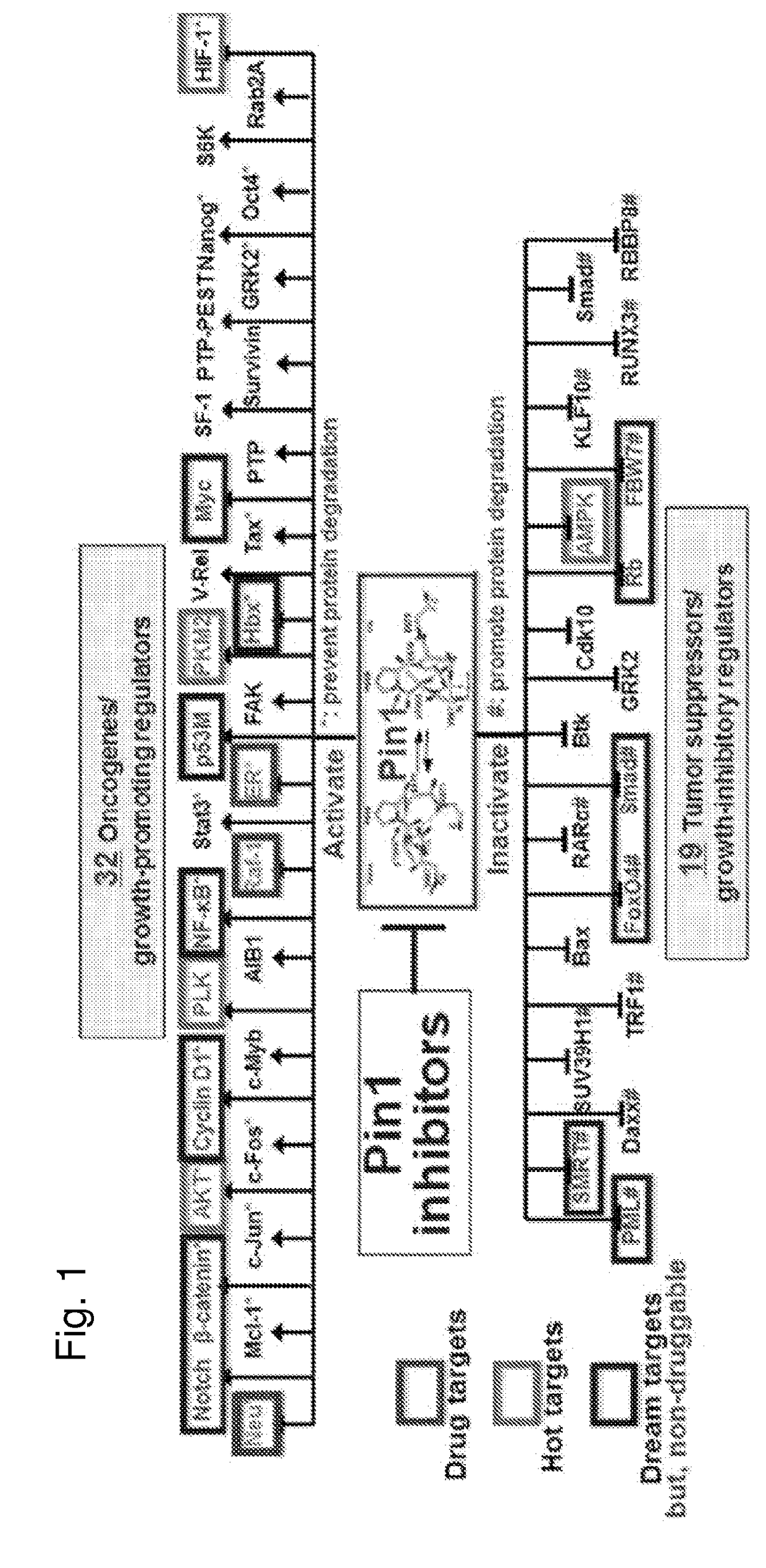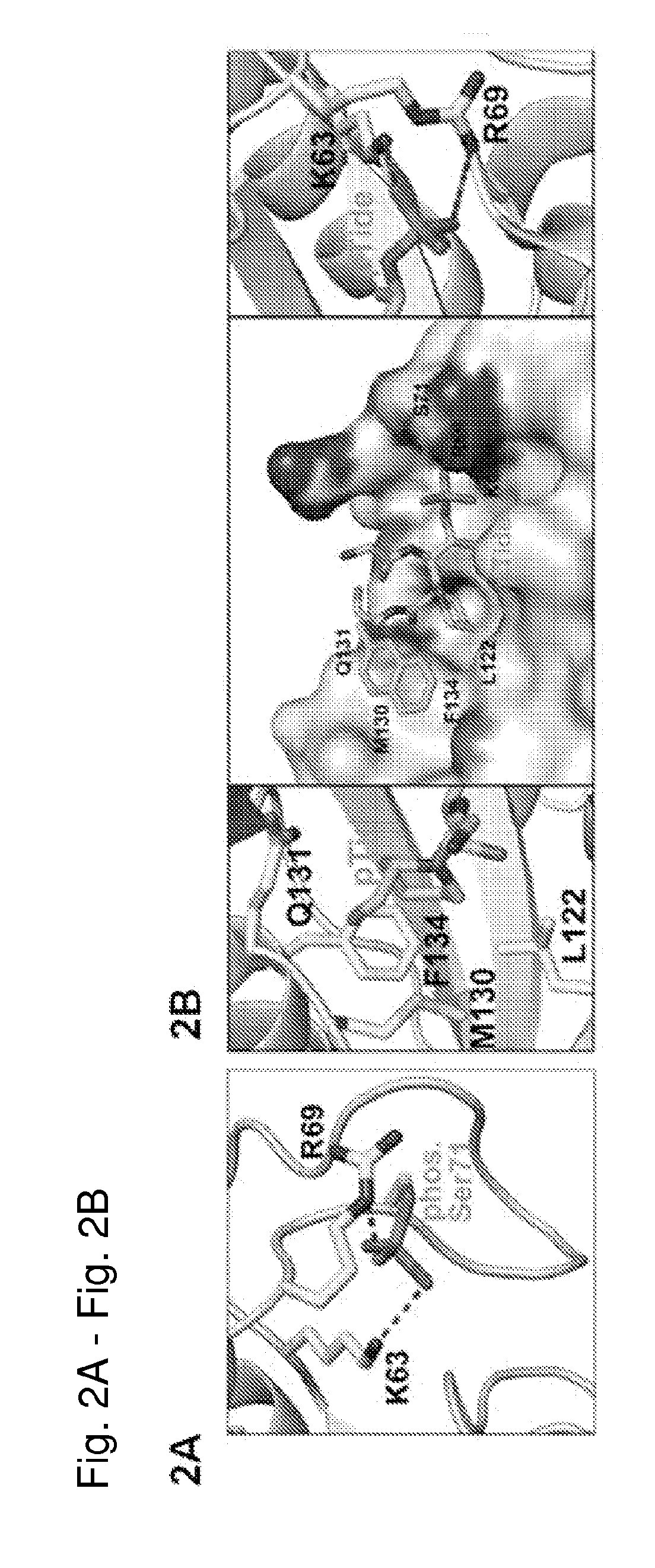Enhanced atra-related compounds derived from structure-activity relationships and modeling for inhibiting pin1
a technology of atra and atra-related compounds, applied in the field of alltrans retinoic acid (atra)related compounds for modulation of pin1, can solve the problems of limited therapeutic modalities, adverse side effects, and insufficient understanding of the mechanisms underlying the mechanism, and achieve the effect of increasing or decreasing the size or length of a componen
- Summary
- Abstract
- Description
- Claims
- Application Information
AI Technical Summary
Benefits of technology
Problems solved by technology
Method used
Image
Examples
example 1
ation of Pin1 Inhibitors
[0508]As described above, phosphorylation of Pin1 on S71 inhibits Pin1 catalytic activity and oncogenic function by blocking a phosphorylated substrate from entering the PPlase active site (see, for example, FIG. 2A). Accordingly, phosphorylated Pin1 can be referred to as inactive Pin1, while non-phosphorylated Pin1 can be referred to active Pin1.
[0509]We have previously shown that phosphorylation (e.g., inactivation) prevents Pin1 from binding to species with high affinity for Pin1. One such species is pTide (Bth-D-phos.Thr-Pip-Nal), a substrate-mimicking inhibitor that selectively binds Pin1 at its PPlase domain and does not bind to the WW domain of Pin1 or to FKBP12 (FIG. 2B). pTide is also known to bind to the Pin1 S71A mutant but not to the S71E mutant, and its binding to the Pin1 PPlase active site is known to involve the residues K63, R69, L122, M130, Q131, and F134 (FIGS. 2C, 21A, 21B, 21C, and 21D). Further, pTide has low cell permeability due to its...
example 3
ing of Selected ATRA-Related Compounds
[0516]Having determined ATRA to be a potent and selective Pin1 substrate, we compared the binding activity of ATRA to several ATRA-related compounds to investigate the structural features important to the association of the substrate with Pin1. These structures are presented in FIGS. 2J and 23A. As a major point of difference between the Pin1 inhibitors ATRA and pTide is the substitution in ATRA of a carboxylic acid group for a phosphate group, several ATRA-related compounds including carboxylic acid groups were selected for study. In the FP assay, ATRA dramatically outperformed the other species. Notably, species (e.g., retinol, retinyl acetate, and retinal) having other functional groups (e.g., hydroxyl, ester, or aldehyde) in place of a carboxylic acid group were totally inactive. The relative inhibition of Pin1 by other species was between 25-64% for fenretinide, bexarotene, acitretin, and tamibarotene, indicating marginal to moderate bindin...
example 4
tion of the ATRA-Pin1 Co-Crystal Structure
[0517]To understand how ATRA inhibits Pin1 catalytic activity, we determined the co-crystal structure of ATRA and the Pin1 PPlase domain. Pin1 PPlase domain (residue 51-163) was cloned into a pET28a derivative vector with an N-terminal hexahistidine tag followed by recognition sequences by thrombin and PreScission 3C proteases and then the recombinant gene. Mutations of K77Q, K82Q were created by QuikChange™ site directed mutagenesis.
[0518]The PPlase K77 / 82Q was purified by overexpression in E. coli BL21 (DE3) strain with isopropyl-β-D-thiogalactopyranoside (IPTG) and induction at 16° C. overnight. Cell lysate was first purified with nickel affinity chromatography. The elution was dialysed in a buffer of pH 8 including 20 mM HEPES, 100 mM NaCl, and 8 mM A-Mercaptoethanol while the protein was treated with PreScission Protease (GE) over night at 4° C. After His tag removal, Pin1 PPlase K77 / 82Q was separated from untruncated protein by a secon...
PUM
| Property | Measurement | Unit |
|---|---|---|
| affinity | aaaaa | aaaaa |
| binding affinity | aaaaa | aaaaa |
| catalytic inhibitory activity | aaaaa | aaaaa |
Abstract
Description
Claims
Application Information
 Login to View More
Login to View More - R&D
- Intellectual Property
- Life Sciences
- Materials
- Tech Scout
- Unparalleled Data Quality
- Higher Quality Content
- 60% Fewer Hallucinations
Browse by: Latest US Patents, China's latest patents, Technical Efficacy Thesaurus, Application Domain, Technology Topic, Popular Technical Reports.
© 2025 PatSnap. All rights reserved.Legal|Privacy policy|Modern Slavery Act Transparency Statement|Sitemap|About US| Contact US: help@patsnap.com



